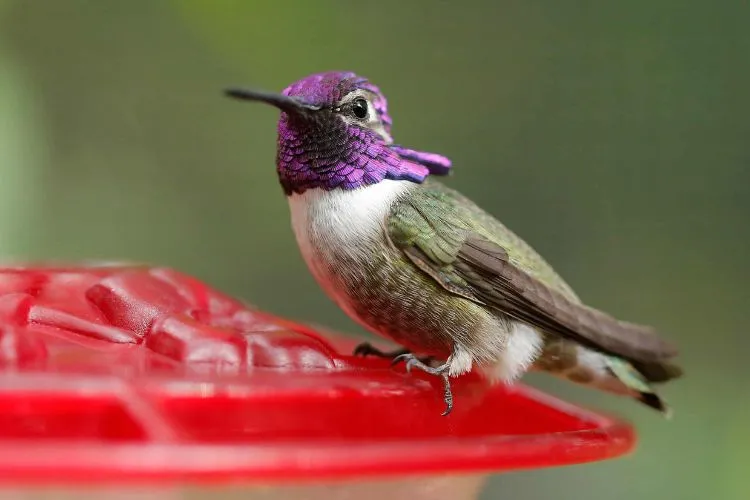Hummingbirds, with their iridescent feathers and rapid wing beats, have captured the imagination of bird lovers and the general public alike.
These tiny birds can hover in air as if by magic, flapping their wings so fast they produce a hum, hence their name.
But, can you have a hummingbird as a pet?
Well, many may wonder if it’s possible to bring the magic of these creatures into their homes as pets.
However, there are important considerations to take into account before attempting to keep a hummingbird as a pet, related to legal, ethical, and practical issues.

🐾 Can You Have A Hummingbird As A Pet?
Hummingbirds are among the smallest of birds, known for their vibrant colors and the ability to hover in place.
They have adapted to feed on nectar from flowers, which gives them the energy they need for their high-speed wing flapping. To maintain this high metabolism, they also consume insects and spiders for protein.
These birds play an essential part in the environment as pollinators. Their long beaks and specialized feeding habits allow them to pollinate flowers that other species cannot reach.
In the wild, hummingbirds are used to vast spaces and typically have a migratory lifestyle, traveling long distances during seasonal changes.
It is within these wide-open spaces that they perform their roles in the ecosystem, roles that are at risk if confined to a cage.
🐾 Legal Considerations
The Migratory Bird Treaty Act of 1918 is a federal law that protects hummingbirds. It makes it illegal to possess, capture, or kill them, or even to keep their feathers.
Each state might also have additional laws and regulations regarding the capture and captivity of wild birds.
International laws, such as the Convention on International Trade in Endangered Species of Wild Fauna and Flora (CITES), also protect hummingbirds and other wildlife.
🐾 Ethical Considerations
Beyond the law, the ethics of keeping wild animals as pets are debatable. Hummingbirds, with their specialized lifestyles, are not suited for life in confinement.
They are creatures that fly great distances and require large territories for foraging. Keeping them in a cage would restrict their natural behaviors and their ability to fly, potentially causing them distress and mental suffering.
Additionally, captive hummingbirds may not live as long due to the stress of confinement and may suffer from health problems not seen in the wild.
🐾 The Challenge of Keeping a Hummingbird as a Pet

The difficulty in replicating a hummingbird’s diet and environment in a home setting is immense. Even the most dedicated pet owner would find it hard to provide the variety of natural nectar and insects that a hummingbird requires for a healthy life.
Moreover, their need for space to fly and hover cannot be easily met in a typical domestic environment.
Health issues are a serious concern as well for captive hummingbirds. In the wild, they are used to constant movement which keeps them fit and healthy.
A confined life can lead to a range of physical and psychological issues including feather plucking and self-mutilation, which are signs of distress.
🐾 Humane Alternatives to Keeping a Hummingbird as a Pet
A better option for those who wish to enjoy the beauty and presence of hummingbirds is to create a hummingbird-friendly garden.
By growing plants that attract these birds and set up feeders filled with sugar water, you can enjoy their presence without causing them harm. Encouraging local populations of hummingbirds can be an immensely rewarding activity.
Conservation efforts are another way to engage with these vibrant birds without keeping them as pets.
Joining citizen science projects, such as monitoring local hummingbird populations and participating in habitat preservation efforts, can be beneficial to the birds and fulfilling for bird enthusiasts.
🐾 Case Studies: Hummingbirds in the Wild vs. Captivity
Research comparing the conditions of hummingbirds in the wild to those in captivity reveals significant disparities in health and behavior.
For instance, a study observed Anna’s Hummingbirds exhibiting complex mating rituals and territory defense in their natural environment, behaviors crucial for their survival and reproduction.
Conversely, a captive situation reported a significant decline in a hummingbird’s health, characterized by irregular feeding patterns and diminished flying ability, leading to weakened muscles and reduced metabolic efficiency.
Such comparative case studies underscore the vital importance of preserving natural habitats for hummingbirds, thus maintaining their physical health and natural behaviors.

🐾 Frequently Asked Questions (FAQs)
Yes, it is illegal under the Migratory Bird Treaty Act of 1918 to keep a hummingbird as a pet in the United States. This includes possessing, capturing, or killing hummingbirds, or keeping their feathers.
Hummingbirds have shown an ability to remember individual humans, especially those who feed them regularly. They have excellent memory for locations and can remember every flower they have been to and how long it will take a flower to refill.
Hummingbirds need a variety of nectar-rich flowers and small insects for protein. They also need safe and secure spots for nesting and resting, and areas for territorial courting displays.
Supporting local and national conservation projects, avoiding the use of pesticides, and planting native, flowering plants can all help to preserve the natural habitats of hummingbirds.
Conclusion:
In conclusion, while the idea of keeping a hummingbird as a pet may be tempting, it is neither practical nor ethical.
Legal restrictions aside, the health and wellbeing of these birds are better supported in their natural habitats.
By creating a hummingbird-friendly yard or participating in conservation efforts, we can enjoy these magnificent birds without harming them.
Let’s admire hummingbirds from a distance, and do what we can to support their survival and wellbeing in the wild.
